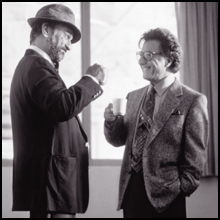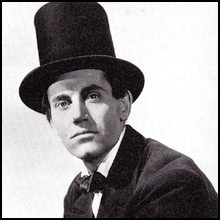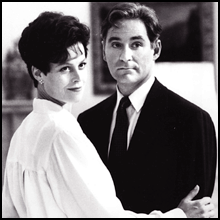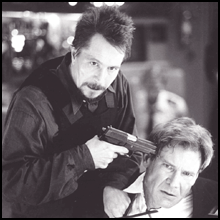![[Sidebar]](/standard/image/sidebar.gif)
![[Movie Reviews]](/standard/image/headers/movie_reviews_header.gif)
| by movie | by theater | hot links | reviews |
All the presidents' movies
How Hollywood plays hail to the chief
by Peter Keough
Wag the Dog
He may not be the most powerful man in the world, as witness his frustrations with Saddam Hussein, not to mention a 24-year-old ex-intern. But the president of the United States could well be the world's most powerful image, a reflection of what we Americans most dread and desire in our nation. Engendered in the hype and hoopla of the campaign, shaped and misshapen by the media, this image achieves its final reality in the ultimate commercial processor of our dreams and nightmares -- Hollywood.That's the premise of Barry Levinson's prescient current political satire, Wag the Dog. Unnervingly prophetic of the current chief executive's current woes -- right down to the beret worn by the object of his sexual attentions and the attempted smokescreen of a concocted war -- Wag is most disturbing in its suggestion that everything we believe to be real and meaningful is, in fact, only a movie.
Although that may not be literally true -- not yet, at least -- there's no doubt that movies provide what we would like to believe is reality, or what we fear might be reality, which can be the same thing. That's why, from the beginning, Hollywood made relatively few films about actual presidents -- the pedestrian reality hits too close to home. It's why the vast majority of recent Hollywood presidents have been mythical: legend always tells the truth more economically than facts. Hollywood's image of the man with the fate of the nation in his hands can waver from superhero and saint to philanderer and psychopath -- sometimes within the same film. And never has that been more true than now; no previous administration has been as obsessively fantasized about and satirized on celluloid as Bill Clinton's.
Young Mr. Lincoln
Honest Abe -- and not much elseHagiography was the prevalent mode for depicting the president in early Hollywood. In the monumental, groundbreaking, grotesquely racist Birth of a Nation (1915), D.W. Griffith, despite his pro-Confederacy and pro-Ku Klux Klan stance, embraces Abraham Lincoln as a hero misled by conniving Abolitionists, who are ultimately implicated in his assassination, putting an end to his more enlightened and tolerant treatment of the South during Reconstruction. ("The South has lost its best friend!" proclaims Birth's KKK-founding hero on hearing of Lincoln's death.) Griffith would complete his portrait of the Great Emancipator with his reverent and tedious Abraham Lincoln (1930), which featured Walter Huston in his first presidential turn in the title role.
Although one of the most vilified presidents while in office (in one of its few amusing moments, the title character in Daryl F. Zanuck's 1944 bio-pic Wilson quotes some especially scurrilous contemporary attacks against Honest Abe), Lincoln has endured as a mythic paragon of presidential virtues. His image served as a bulwark of democracy during the late Depression and pre-war years, when our way of life was being challenged by the rise of fascism and the threat of communism. In John Ford's Young Mr. Lincoln (1939), Henry Fonda forged an image of the future president as a young man, the "plain Abraham Lincoln" who loves his mother and pays his bills and falls in love and just happens to embody, express, and defend with resolute courage and homespun humor all the principles America is based on.
It was a hard act to follow, as Raymond Massey would discover in the stagy, uninspiring Abe Lincoln in Illinois (1940), though he earned an Oscar nomination for his portrayal (the more deserving Fonda did not). But other US presidents have been more notable for their absence. Where are all the bio-pics of George Washington? Perhaps it's the wooden teeth. As for the rest of the Founding Fathers, we'll have to settle for 1776 (1972).
There are exceptions, like the recent, misconceived Jefferson in Paris (1995). And Charlton Heston plays Andrew Jackson in a couple films: The President's Lady (1953), in which he's a stiff romantic hero overshadowed by sexy Susan Hayward as his wife with a checkered past -- who consequently must die before he can enter the White House; and The Buccaneer (1958), where he plays the then general as a kind of Clint Eastwood type overshadowed by Yul Brynner as a sexy Jean Laffite.
The advantage that Lincoln has over all his colleagues -- besides his august wisdom and courage in saving the nation -- is his messianic fate. Martyrdom transcends human frailties and commonplaces and elevates the victim to the highest realms of Hollywood illusions. If it didn't work that way for Kennedy after the tiresome exploits of PT 109 (1963), that's because everybody was too busy arguing over who shot JFK.
Wilson: he was no Lincoln
Neither did dying in office do much for the reputation of Woodrow Wilson (perhaps best remembered these days as the first presidential film critic, with his oft-quoted description of Birth of a Nation as "history written with lightning"), despite Daryl F. Zanuck's gaudy and godawful Wilson. An attempt to garner Oscars (it won for Best Screenplay and was nominated for Best Picture and in three other categories) and stump for democracy at the height of World War II (with more speeches, patriotic music, and red-white-and-blue than a Republican Convention, it may have had some viewers rooting for the Axis), Wilson undid itself from the start with its references and comparisons to Lincoln. Yet the film does broach two aspects of the president we don't like to think about -- his sexuality and his mortality. Played by a weasely Alexander Knox, Wilson is no Clinton, though he is surrounded by three annoyingly adoring daughters and a mousily supportive wife. The latter dies, however (shades of The President's Lady), leaving the door open for Woodrow to date. He hooks up with a handsome society girl, ignores the nasty gossip, gets remarried and re-elected, and enters the Great War.
Here the story comes to resemble not so much Lincoln's as that of the then incumbent, FDR. Battered by the strain of war and the even greater strain of selling the American people on the League of Nations, Wilson suffers a stroke, is incapacitated, and has his duties overseen by the woman who nearly cost him the election -- his second wife.
This vaguely castrating scenario had been the basis of a bizarre curiosity released a decade before, Gregory LaCava's Capra-esque, quasi-fascist Gabriel over the White House (1933). Walter Huston starts out decidedly un-Lincoln-like as the newly elected President Judson Hammond, a gladhanding party hack blithely indifferent to the needs of his Depression-racked countrymen and with a fair eye to the politicos that put him in office and his toothsome "private secretary."
In a twist that is one of several precursors to contemporary events (the film was based on a novel by "Anonymous," à la Primary Colors), Hammond goes into a coma after his limo gets creamed while fleeing, Princess Di-like, pursuing paparazzi. He awakens a changed man, shooing the secretary from his bedroom, putting the unemployed to work, declaring martial law, dissolving Congress, and terrorizing debtor nations into paying up. He has been possessed, it seems, by the archangel Gabriel, who, as one character points out, gave voice to the Biblical Daniel, "the prophet of wrath." In more historical parlance, Hammond starts out as Harding, is transformed into Roosevelt, and settles into Hitler -- then just starting in on his Third Reich.
So was Hammond the leader we wanted or dreaded? Evidently a little of both. Times of crisis, after all, tend to bring out the kind of oxymoronic emotions that it's the movies' job to resolve.
Let's hear it for . . . Merton Muffley?
During World War II, Hollywood was too busy making patriotic films to worry much about the president. And during the '50s, Hollywood was too busy protecting itself from Senator McCarthy to ask many questions about the Eisenhower era. In the '60s, however, the gloves finally came off. The Cold War, men in space, the Cuban Missile Crisis, civil rights, the Kennedy assassinations, the Beatles, the sexual revolution, Vietnam, the Democratic Convention of '68 -- it was the Decade of Uncertainty. It was also the heyday of political satire -- as Bob Dylan sang, "Even the president of the United States sometimes has to stand naked."
Hollywood could have retreated into nostalgia; instead some of America's foremost filmmakers set out to critique the emperor's new clothes. Notwithstanding the popularity of Kennedy and, pre-Vietnam, Johnson, the president was depicted as impotent, as a patsy for the system intended to serve him (a theme that would be hammered on years later in Oliver Stone's JFK). Candidate Laurence Harvey in John Frankenheimer's mordantly brilliant Manchurian Candidate (1962) is a wimp, a brainwashed dupe of the Chinese and, more terrifyingly still, of his hideous, devouring mother, played by Angela Lansbury. No better is the mealy-mouthed, senescent president in Otto Preminger's Advise and Consent (1962), whose attempt to appoint the soft-on-communism Henry Fonda as secretary of state is undermined by a conspiracy of political enemies and revelations of a possible homosexual past.
Dr. Strangelove
Fonda does rehabilitate his Lincolnesque image in Sidney Lumet's harrowing Fail Safe (1963), though he is forced by a glitch in the nuclear-defense system to incinerate New York City, and, in a chilling aside that seems a motif in movies about the president (with variations in The President's Lady, Wilson, Mars Attacks!, Independence Day, and Air Force One), the first lady as well. Whatever virility Fonda restored to the president, however, was subverted in that film's black-comic mirror image, Stanley Kubrick's Dr. Strangelove (1963). In one of three roles, Peter Sellars is Merton Muffley, a fusion of Dwight Eisenhower and Adlai Stevenson who's as effeminate and ineffectual as his name suggests. What passes for balls is military hardware -- a midair refueling of a B-52 is one of Kubrick's most erotic sequences. A psychopathic commander, Jack D. Ripper (Sterling Hayden), compensates for his sexual dysfunction by usurping control of the nuclear-defense system and initiating a strike against the Soviet Union. Sabotaging the coding system by which the commander-in-chief can recall the aircraft, he severs the president from presidential power, allowing the system itself to take over.At least Dr. Strangelove offered serious satire. The following year Hollywood gave us Kisses for My President. Bad enough to imagine Fred MacMurray as the commander-in-chief and Polly Bergen as our first lady -- but Kisses starred Polly as Mrs. President and Fred as the, uh, first spouse. It was a mirror of our uneasiness over the prospect of a woman at the top, and our fear that the protective patriarchy of the presidency was a thing of the past.
Life imitates art
That, of course, was before Watergate, which debased the executive office in a way Hollywood could scarcely have imagined -- while redeeming, temporarily, the reputation of the media, as witness the heroics of Bernstein and Woodward in All the President's Men (1976). Watergate also lay open the previously sacrosanct Oval Office to the prying eyes and ears of everyone, making the president's character as well as his policy available to scrutiny. Perhaps the most shocking revelation from the Watergate tapes was not that the president authorized violations of the Constitution but that he used bad language.
Nixon
One would have expected the decade following Nixon's disgrace to see a plethora of films demonizing him and the presidency; except for Robert Altman's worthy but overlooked Secret Honor (1983), however, none of major significance surfaced until Oliver Stone's disappointing Nixon (1995). The Reagan administration, in particular, escaped almost unscathed. Although he was our first divorced president, Reagan was also our first movie-star president. And as the Great Communicator, he skillfully separated image from content, making the '80s the Decade of Detachment and Disillusion. There was no need for Hollywood to make films about the presidency when it had a master director in the White House: from 1980 to 1988, the presidency was the movie.
Who's wagging who?
But now it's the '90s, and Clinton has inherited both the boon of media-created reality instituted by Reagan and the bane of the media's total accessibility to the president's private life that was Nixon's legacy. He's at least as slick a communicator as Reagan, and apart from JFK he's the only studmuffin we've had in office. (Bush, on the other hand, will be remembered for vomiting on the Japanese prime minister.) But though sexual charisma helped get both Kennedy and Clinton elected, Kennedy reigned in the days before full-frontal disclosure. These days Clinton is seen less as sexually potent than as sexually subjugated -- not only by his own compulsions but by the matriarchal hand of Hillary, which threatens to make Kisses for My President a reality.
Dave
Initially he got the benefit of Hollywood's doubt, with the transition to the new administration being marked by Dave (1993). As an oddly Bush-looking incumbent, Kevin Kline is shown in one of the very first scenes ogling a comely member of his staff. His look-alike, Dave (Kline also), fills in at an official function while the president does some secret service of his own with the willing secretary. In midstride the president suffers a stroke and lapses into a coma (shades of Gabriel over the White House), and Dave has to fill-in on a full time basis. What follows is a liberal wet dream of what might have been the Clinton years to come, with the ingenuous Dave warming the cockles of the first lady (Sigourney Weaver), pushing through an enlightened agenda, and pushing out the Watergate holdovers in the White House.The Hollywood honeymoon with Clinton continued with 1995's The American President (shades of Wilson), in which widower Michael Douglas has his cockles warmed by lovely liberal activist Annette Bening, rebuts the scandal-mongering slurs of his enemies, pushes through an enlightened agenda, and pushes out a Jesse Helms-like senator played by Richard Dreyfuss -- as well as the requisite Watergate holdovers in his office.
Quicker than you could say Whitewater, things went bad. In Clint Eastwood's Absolute Power (1997), Gene Hackman plays an adulterous president so craven, corrupt, and disgusting that he screws his best friend's wife, beats her up, and has his Secret Service agents blow her away when she tries to defend herself with a letter opener. In Murder at 1600 (1997), not only the president but his son is playing pocket-the-veto with another soon-to-be murder victim.
Air Force One
Then there were the blockbusting movies that reflected badly on our noncombatant commander-in-chief. Bill Pullman played a Medal of Honor-winning president who kicks alien butt and saves the planet in Independence Day (1996). Harrison Ford played a Medal of Honor-winning president who kicks terrorist butt and saves his family in Air Force One (1997). Bill Clinton was looking more and more like Merton Muffley.
Okay, that's a wrap
It's satisfying to watch the president dangle 12,000 feet above the surface of the earth from an airplane or lead a wing of F-16s in an attack on a mother ship the size of Utah, but we know these are only fantasies. The more troubling question is whether the presidency itself isn't a fantasy. Ever since Woody Allen morphed himself into footage of Herbert Hoover and the like in Zelig (1983), such filmmakers as Oliver Stone in JFK (1991) and Robert Zemeckis in Forrest Gump (1994) have been blurring the line between reality and special effects by using images of politicians to further their big-screen fantasies. In Contact (1997) Zemeckis incorporated an actual Clinton press conference -- over the objections of the president, who didn't want to be a part of someone else's film. The lessons were clear: if real-life politics isn't a movie, it can certainly be made to look like one; and even the president is no longer powerful enough to be his own director.
Wag the Dog is the most extreme example yet of the White House as just another Hollywood set. At least Barry Levinson's film let us in on the joke. But it couldn't compete with the soap opera of Clinton's real life -- which is probably why, except in Washington, the box office for Wag the Dog dropped after the Monica Lewinsky story broke. And why the people adapting Primary Colors (set to open March 20), which looked such a surefire hit just weeks ago, are worried. The high jinks of campaign '92 seem a little stale these days, and why watch a fictionalized version of presidential peccadilloes when the real thing is available for free on TV and is a lot more entertaining? Hollywood has finally figured out that the presidency is indeed just another movie. Now it has to discover how to turn out better movies than the White House is making.
| home page | what's new | search | about the phoenix | feedback |
Copyright © 1998 The Phoenix Media/Communications Group. All rights reserved.





